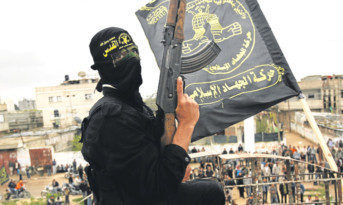
A police chief has sparked anger by suggesting British-born IS extremists should be treated for post-traumatic stress on their return to the UK.
Speaking in the week Westminster raised Britain’s terror threat level to ‘severe’, Sir Stephen House said people returning from Iraq and Syria should be offered psychological help to deal with their experiences. His comments appeared to advocate therapy being offered to Islamic State (IS) terrorists.
The Chief Constable of Police Scotland who used to be assistant commissioner of the Metropolitan Police said: “Of those who come back, some may come back with a view of ‘What happened out there is outrageous and I’m going to take some form of violent action back in the United Kingdom’.
“Some will come back thinking ‘Well I did my bit and that’s that, back to normal life’, some will come back and be activists but not violent political activists, and some will come back and need help because they’ll be suffering from post-traumatic stress from what they’ve seen and experienced out there.
“I think it is up to Government, security service and police services to try and deal with each one of them in an appropriate way.”
Home Secretary Theresa May in increasing Britain’s terror threat level to ‘severe’ confirmed that it is now ‘likely’ that Islamic fundamentalists are planning a terror attack.
It comes as Prime Minister David Cameron seeks to bring in new measures to help counter the current terror threat. He spent yesterday with Nick Clegg thrashing out legislation which may make the confiscation of passports belonging to suspected Islamic extremists easier.
The PM is expected to make a Commons statement tomorrow, announcing steps to close “gaps in our armoury”.
The Government has revealed it is highly likely home-grown jihadists have returned home and may be planning atrocities here. Offset against a fast moving political climate, the comments from the £216,000-a-year Chief Constable have been met with incredulity.
Scottish Conservative chief whip John Lamont said: “If these comments are true, Sir Stephen is going to have to give a pretty impressive explanation as to why.
“It seems while the UK Government is taking steps to crack down on terror tourism, Police Scotland wants to mollycoddle it.”
Vince Egan, an associate professor of forensic and clinical psychology at the University of Nottingham, said such a stance is unlikely to appease the families of people beheaded by terrorists. “The Islamic State is a state,” he said. “If someone is fighting for a state then they are not a national for the country they’ve left.”
Police Scotland said: “We are working tirelessly to identify people with links to Scotland who may have gone out there to fight and to make sure that we deal with the implications, if indeed they do return.”

Enjoy the convenience of having The Sunday Post delivered as a digital ePaper straight to your smartphone, tablet or computer.
Subscribe for only £5.49 a month and enjoy all the benefits of the printed paper as a digital replica.
Subscribe